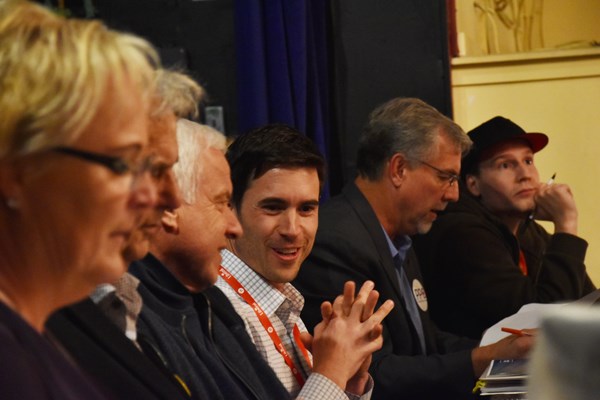Childcare, beer and downtempo music signalled a focus on young people at the all-candidates forum held at Roberts Creek Hall and organized by Voice Lab for voters under 40 casting their ballots in the Oct. 21 federal election.
Affordable living emerged as a dominant theme at the event and out of the gates candidates baked the issue into their opening statements, save for Gordon Jeffrey, running for the Rhinoceros Party, who used his time to castigate the major parties: “Red, blue, orange – it’s all brown, flush it down.”
When asked how they would make housing affordable for young adults and families on the Sunshine Coast, Conservative candidate Gabrielle Loren said her party plans to use “excess surplus federal lands to build housing,” noting it would take up to five years to do it.
Green Party candidate Dana Taylor highlighted his party’s commitment to review the national housing strategy and said the focus shouldn’t be on ownership but on “safe, secure, available housing when and where it’s needed.”
Liberal candidate Patrick Weiler also steered the question towards rental and alternative housing, calling the West Vancouver-Sunshine Coast-Sea to Sky riding “one of the most unaffordable ridings in the entire country” and acknowledging that the idea of homeownership is “out of reach” for many people in the 33-year-old’s generation.
Weiler said a similar project to one that received $7.3 million from the federal government for market rental housing in Whistler is needed on the Coast. “We can do that by providing federal lands, as we did in Gibsons for housing,” he said, adding that it would require working with provincial and municipal levels of government to identify areas.
Candidates also had a chance sway voters with their approach to affordable childcare.
Loren said she would advocate for companies to collaborate on providing daycare as a tax-free benefit to their staff, which received applause.
Weiler said the Liberals promise to add 250,000 childcare spaces nation-wide, and reduce the cost by 10 per cent, in addition to bringing in more parental leave, in particular for parents who are adopting. “We need to be making life more affordable for families. That’s just critical for everybody,” he said.
NDP candidate Judith Wilson acknowledged a “huge shortage of licensed daycare spaces.” She also highlighted her party’s commitment to a universal childcare program, priced at $10 a day, “to make it possible for women, especially, to enter the workforce that have been unable to because of low wage jobs.” That commitment was echoed by Taylor.
While Jeffrey admitted he wasn’t aware of the need for cheaper childcare until he “saw friends marching about this issue down in Squamish,” he would “come up with a great plan,” if constituents asked for it.
Terry Grimmwood, meanwhile, said his party, Canada Fresh, believes the country “needs more children. We need to grow our population,” and would support incentives for families to grow, including minimum wage for parents who stay home to look after their children.
PPC candidate Doug Bebb took an opposite tack later in the evening, when the final question on housing affordability was asked – whether there is an increased need to provide “low income, cooperative, subsidized transitional housing opportunities” for homeless people on the Sunshine Coast and their plans to address it.
“The housing shortage is a matter of supply and demand,” Bebb said. “One way to decrease demand is to cut immigration to 150,000 and that will also reduce medical wait times, it’ll reduce school overcrowding.” He said tax cuts and tackling off-shore home purchasing would also reduce demand.
Wilson promised the audience she would ask for a homelessness plan that focuses specifically on the riding and said she would “aggressively go after whatever money is out there in terms of housing.” She also said she'd work with constituents on creative solutions. “We can work together as human beings to extend a hand to the people in our community who need our help but that requires leadership, and I would certainly use my office to coordinate that activity.”
Responses also went local when candidates were asked at the end of the night what they would do to stimulate the Sunshine Coast’s rural economy.
Loren referenced a Sunshine Coast Community Foundation report that found 25 per cent of Coasters are self-employed, and championed her party’s commitment to allow income splitting with spouses, “reducing red tape,” and providing support for small business owners navigating the Tax Act.
Taylor said he would promote regenerative agriculture and local food production on the Coast, while Wilson said she’d work to develop wind and solar projects.
But it was Jeffrey who got the biggest applause on that question with his shout out to a local fish and chips eatery. Claiming that foreign interests get preferential treatment in the salmon industry, he said: “I would do away with that and make sure that Sharkey’s had all the salmon they needed.”
The crowd cheered.



